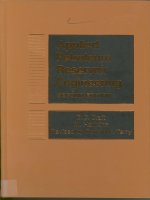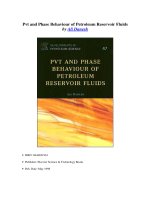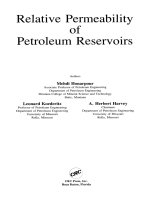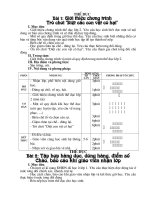2 petroleum reservoir engineering slides (feb 2016)
Bạn đang xem bản rút gọn của tài liệu. Xem và tải ngay bản đầy đủ của tài liệu tại đây (3.04 MB, 248 trang )
GEOPET BACHELOR PROGRAM IN
PETROLEUM ENGINEERING
PETROLEUM RESERVOIR
ENGINEERING
04/07/2023
Mai Cao Lân – Faculty of Geology & Petroleum Engineering - HCMUT
1
Learning Objectives
At the end of this lecture, you should be able to understand the
fundamentals of reservoir engineering and do some basic
analyses/calculations as follows:
PVT Analysis
Special Core Analysis
Well Test Analysis
Production Forecast
04/07/2023
Mai Cao Lân – Faculty of Geology & Petroleum Engineering - HCMUT
2
References
1. L.P.Dake (1978). Fundamentals of Reservoir Engineering,
Elsevier Science, Amsterdam.
2. L.P.Dake (1994). The Practice of Reservoir Engineering,
Elsevier Science, Amsterdam.
3. B.C.Craft & M.Hawkins (1991). Applied Petroleum
Reservoir Engineering,Prentice Hall, New Jersey.
4. T. Ahmed (2006). Reservoir Engineering Handbook , Gulf
Professional Publishing, Oxford.
04/07/2023
Mai Cao Lân – Faculty of Geology & Petroleum Engineering - HCMUT
3
Outline
Key Concepts in Reservoir Engineering
Fundamentals of Oil & Gas Reservoirs
Quantitative Methods in Reservoir Characterization and
Evaluation.
04/07/2023
Mai Cao Lân – Faculty of Geology & Petroleum Engineering - HCMUT
4
Part I
Key Concepts in
Reservoir Engineering
04/07/2023
Mai Cao Lân – Faculty of Geology & Petroleum Engineering - HCMUT
5
Definition of Reservoir
In petroleum industry, reservoir fluids is a mixture of
hydrocarbons (oil and/or gas), water and other non-hydrocarbon
compounds (such as H2S, CO2, N2, ...)
04/07/2023
Mai Cao Lân – Faculty of Geology & Petroleum Engineering - HCMUT
6
Definition of Engineering
Engineering is the discipline or profession of
applying necessary knowledge and utilizing
physical resources in order to design and
implement systems and processes that realize a
desired objective and meet specified criteria.
04/07/2023
Mai Cao Lân – Faculty of Geology & Petroleum Engineering - HCMUT
7
Definition of Engineering
Engineering is the discipline and profession of
applying necessary knowledge and utilizing
physical resources in order to design and
implement systems and processes that realize a
desired objective and meet specified criteria.
04/07/2023
Mai Cao Lân – Faculty of Geology & Petroleum Engineering - HCMUT
8
Necessary Knowledge
Knowledge about oil & gas reservoirs
Reservoir Rock Properties & Behavior during the
Production Process
Reservoir Fluid Properties & Behavior during the
Production Process
Fluid Flows in Reservoirs
04/07/2023
Mai Cao Lân – Faculty of Geology & Petroleum Engineering - HCMUT
9
Necessary Knowledge (cont’d)
Technical & Scientific Knowledge
Quantitative Methods for Reservoir
Characterization
Quantitative Methods for Reservoir
Evaluation
04/07/2023
Mai Cao Lân – Faculty of Geology & Petroleum Engineering - HCMUT
10
Definition of Engineering
Engineering is the discipline and profession of
applying necessary knowledge and utilizing
physical resources in order to design and
implement systems and processes that realize a
desired objective and meet specified criteria.
04/07/2023
Mai Cao Lân – Faculty of Geology & Petroleum Engineering - HCMUT
11
Physical Resources
In-place Reservoir Resources
Reservoir’s energy source resulted from the
initial pressure & drive mechanisms during
production
Available flow conduits thanks to reservoir’s
characteristic properties such as permeability
distribution.
04/07/2023
Mai Cao Lân – Faculty of Geology & Petroleum Engineering - HCMUT
12
Definition of Engineering
Engineering is the discipline and profession of
applying necessary knowledge and utilizing
physical resources in order to design and
implement systems and processes that realize a
desired objective and meet specified criteria.
04/07/2023
Mai Cao Lân – Faculty of Geology & Petroleum Engineering - HCMUT
13
Design and Implementation
Design and Implement an Oil Field Development Plan
Plan for producing oil & gas from the reservoirs in the
field: Exploit reservoir energy sources; Design
appropreate well patterns; Select suitable subsurface &
surface facilities ... during the lifecycle of the oil field
04/07/2023
Mai Cao Lân – Faculty of Geology & Petroleum Engineering - HCMUT
14
Definition of Engineering
Engineering is the discipline and profession of
applying necessary knowledge and utilizing
physical resources in order to design and
implement systems and processes that realize a
desired objective and meet specified criteria.
04/07/2023
Mai Cao Lân – Faculty of Geology & Petroleum Engineering - HCMUT
15
Desired Objective
To Maximize the profit resulted from the
recovered oil & gas
To recover as much as possible oil & gas from
the reservoirs
To recover high-quality oil & gas
04/07/2023
Mai Cao Lân – Faculty of Geology & Petroleum Engineering - HCMUT
16
Definition of Engineering
Engineering is the discipline and profession of
applying necessary knowledge and utilizing
physical resources in order to design and
implement systems and processes that realize a
desired objective and meet specified criteria.
04/07/2023
Mai Cao Lân – Faculty of Geology & Petroleum Engineering - HCMUT
17
Specified Criteria
Money associated with hired manpower,
facilities, technologies, ...
Time
Local regulations
04/07/2023
Mai Cao Lân – Faculty of Geology & Petroleum Engineering - HCMUT
18
Oil Fields and Their Lifecycle
04/07/2023
Mai Cao Lân – Faculty of Geology & Petroleum Engineering - HCMUT
19
Oil Fields and Their Lifecycle
A lifecycle of an oil field consists of the following stages:
Exploration
Appraisal
Development
Production
Abandonment
04/07/2023
Mai Cao Lân – Faculty of Geology & Petroleum Engineering - HCMUT
20









